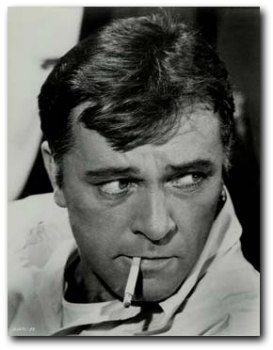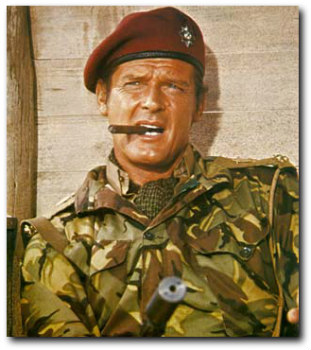
HOMEWesley Britton’s Books,
|
Spies on FilmSpies on Television & RadioSpies in History & LiteratureThe James Bond Files |
|
Spies on Film ~ Sex, Scotch, and
Wild Geese – A Few Drinks with Richard
Burton
By Ronald Payne 
Richard Burton as Dr. Edward Hewitt in The Sandpiper (MGM, 1965). Editor’s Note ~ Writer Ronald Payne spent an evening with Richard Burton in 1979 while Payne was staying in London’s Dorchester Hotel. Burton and Payne met in front of the Hotel, “in plain sight through the alley to 2 South Audley Street. Cubby Broccoli’s EON Productions was on one side with Hyde Park on the other.” As shown in the interview below, Payne’s following “two and a half hour tipple with the jocular Burton was most informative and insightful.” During their conversation, Burton had much to say about actors and actors, notably his co-stars of his then most recent film, The Wild Geese – Roger Moore and Richard Harris. During the talk, Ron Payne was startled when Burton had some questions of his own regarding Ron’s spy novel, Shadows in the Sun. But not everything in their conversation ended up in the interview published below. For example, their talk revealed some commonalities in their lives – Richard Burton and Susan Hunt, his third wife, had been married in Gloucester County, Virginia, only ten miles from Payne’s lifelong home. In 1977, Payne had been a Delegate to the Virginia Republican convention, where he had met Elizabeth Taylor. Ron says Burton was intrigued that Elizabeth would marry John Warner, whom she had help get elected as United States Senator from Virginia. This interview first appeared in 1991 in a now defunct Richmond quarterly called The Times. SpywiseSecretDossier is delighted to reproduce this conversation for an international audience – for the first time. “The name is Burton. I’m the son of a poor Welsh coal miner named Jenkins.” The blue eyes were bloodshot, but the voice was deep, distinctive and clear. He smiled. “You’re Canadian, aren’t you?” “No, Virginian,” I said with emphasis. “I have friends in Virginia,” Burton said. “Your accent sounds Canadian. How did you manage that?” Of course, he had picked up on the Tidewater “out and about” sounds that sound like gout, familiar to my county of Middlesex, but also representative of Eastern Canada. “Born with it. Can’t get rid of it,” I said. “Good for you, lad,” Burton said, patting me hard on the shoulder with a force that almost sent me backward. “One should never defy his roots. I have defied mine from time to time, but I always come back. One must always go home again. Just ask my brother, Graham, who says I’m more Welsh now than when I lived there as a boy. I don’t care what Thomas Wolfe said about not going home again. That’s all rubbish. And, besides, he wasn’t a Welshman, but a North Carolinian of Scots ancestry. Dylan Thomas, who was Welsh, like myself, knew better. Knew better than anyone. Once a Welshman always a Welshman. What else would I be? I’m still the son of a coal miner named Jenkins and I shall be Rich Jenkins until the day I die.” Burton had a drink in his hand. A massive glass. It was his third go and Burton was preparing for more. Scotch. “I deplore the stuff. Can’t drink anymore. It’ll put me in hospital, if I stay at it. I’m not really drinking today. Just keeping up the image for appearance sake. The reporters and the paparazi expect it. Even my friends expect their Rich to be souced a bit. It’s romantic territory. I’m really a poet. All the great poets drank like fish. Keats. Byron. Shelley. Dylan Thomas. I would have rather been a fair-to-middling writer than the best actor in the world. Writers have an inner life actors never get.” Burton lit his lighter with a fierce snap. “Writers are special people. I haven’t the discipline to write. I can’t tough it out over the long haul, though God knows I’ve attempted it. I would have liked to have played James Joyce, but there was never a good script.” He slipped on some dark glasses. “Albert Finney is the greatest actor in the world. Then Peter O’Toole. Brando. Olivier and Gielgud belong to another time and place. They’re immortal, but remote from the rest of us. Sean Connery is vastly underrated. I would like to do a play with Michael Caine, whom I respect. I like Alan Bates. Frank Finley is a hard man to follow in the second act. Unbeatable self-discipline.” He blew out some smoke toward the window facing the street. It was a gorgeous autumn day in London. “I won’t be recognized here wearing these. Will you be recognized?” “Most likely.” Small swells of laughter followed. “Perhaps you should carry dark glasses of your own.” “I do,” I said, producing a pair even darker than his. “After our 25th drink together, I suggest we go piss in the street,” Burton said. “That will bring us a bit of notoriety and we shall be famous together.” The merriment of the practical jokester danced in his eyes. Across the street we could see his name in lights on the marquee for his film, The Wild Geese. “I enjoyed doing that film.” “Wild Geese, you mean?” “I bloody well don’t mean Cleopatra. Euan Lloyd produced Wild Geese. He knows how to make action films. I’m Colonel Falkner in the film. Best role of its type since Where Eagles Dare.” 
Roger Moore in a scene from The Wild Geese (1978). “What’s Roger Moore like?” “Handsome. A good friend. A neighbor in Switzerland.” “Richard Harris?” “Good friend. He’s better in Camelot than I was.” “How so?” “He knew how to get the part in the film. Sent telegrams, dozens of them, to Jack Warner saying, ‘Burton too short, hire Harris. Burton unavailable, hire Harris. Burton ill with Chinese chickenpox, hire Harris.’ So J.L. Warner hired Harris. He was terrific as Arthur.” “You said Arthur was your favorite role.” “Favorite part. Loved Julie Andrews. Platonically. Never slept with her. I could never sleep with Mary Poppins. Bob Goulet, great. Never met a kinder man. I do sometimes regret the three of us didn’t do the film together, but coal miner’s sons and kings never look back.” Burton started to fidget in his chair, in spite of the drinks. “I’m out of smokes. Have you a cigarette?” “Gaulois.” “Bless you, my son. Peter O’Toole and I practically bought the Gaulois Company when we worked on Beckett together. And the Guiness Company, too, I might add. Elizabeth thought Pete a bad influence on me. Believed he was corrupting me. I’m not a child, you know. I was born full grown. If I’m corrupted, it happened long before I met the bookmaker’s son (referring to O’Toole's father) who now resides in Connemara.” “I’m a reader, you know,” Burton said, proudly. “I was corrupted by Faust. And Shakespeare. And Proust. And Hemingway. But mostly I was corrupted by Dylan Thomas. Most people see me as a rake, womanizer, boozer and purchaser of large baubles. I’m all those things depending on the prism and the light. But mostly I’m a reader. Give me Agatha Christie for an hour and I’m happy as a clam. The house in Celigny some day will cave in under its own weight from the books. I hope I’m there when it does. One hundred six years old. Investigating the newest thriller from Le Carré or a new play from Tennessee Williams.” Then out of nowhere, he asked: “Much sex?” “Pardon me, I didn’t catch what. . . ” “Much sex in Shadows in the Sun? Your novel . . . ” “Full of sex,” I said, watching his laughter build. “Good. A little gratuitous sex for the sake of literature never hurts,” Burton said, taking a large swallow of ale that accompanied his Scotch. “It is natural between a man and a woman. Sex gives life essence. Harmony. A man should always be searching for harmony.” “You mean a man should always be searching for sex.” “Have it your own way, lad. I played a sex-drenched doctor in The Bramble Bush. It was the worst picture I ever made, if you don’t count Ice Palace. That one was based upon a very weak novel by Edna Ferber. Both pictures for Warner Brothers. Jack Warner told the press I had no sex appeal. Then Elizabeth came along. All changed after that. Suddenly, Eddie Fisher didn’t have sex appeal. And I did. It’s a crazy world for a Welsh coal miner’s son born in November, 1925.” He looked sad. “I almost replaced Sean Connery as James Bond in Thunderball. This was before Sean played Bond. My friend, the Irish producer, Kevin O’Donovan McClory wanted me. Kevin worked for Mike Todd on Around the World in 80 Days and I was impressed with his Irish rebelliousness. We Welsh have that, too, but not quite like the Irish who transfuse it into their blood on the same day they are born. McClory promised Hitchcock would direct and I had great hopes for the project. It fell through, of course – and later Kevin made a bloody fortune, when Sean was Bond. I wonder sometimes how it might all have turned out. Fleming was big on me for the role. Stewart Granger was next in line.” Burton shrugged his shoulders as he watched an old man let a pigeon walk on his head. He left a 20 pound note for the bar waitress, who was blonde and buxom and possessed a beautiful movie star like smile. I never saw him again. But Burton was kind enough to later send me a photo (now in deep storage, unfortunately) of his library in Celigny, Switzerland, with its beautiful custom-made cabinetry. He was big on reading the small “Everyman Library,” and built his cabinets to accompany them. He also sent me the design for recreating his library, in the event I wished to duplicate it. I thought this a terribly generous gesture. To read Ron Payne’s “Untold Stories of 007” and his tribute to his friend, O. F. Snelling, check out “The O.F. Snelling 007 Archives”, located in The James Bond Files section of this website. All photos courtesy of Lee Pfeiffer and
Cinema Retro magazine.
|